#robin ekiss
Text
favourite poems of september
robin blaser the holy forest: collected poems of robin blaser: "[dear dusty moth]"
robin ekiss the mansion of happiness: "the bones of august"
e.e. cummings complete poems 1904-1962: "[anyone lived in a pretty how town]"
daisy fried econo motel, ocean city
david campos guilt shower and bad catholic
deborah a. miranda the zen of la llorona: "advice from la llorona"
v. penelope pelizzon blood memory
aimee nezhukumatathil invitation
jeffrey jullich portrait of colon dash paranthesis: "some materials may be inappropriate for children"
karina borowicz september tomatoes
patricia kirkpatrick survivor's guilt
kamau brathwaite born to slow horses: "i was wash-way in blood"
leslie adrienne miller the resurrection trade: "weaning"
allen edwin butt if briefly
gerrit lansing a february sheaf: selected writings, verse and prose: "how we sizzled in the pasture"
jayne cortez on the imperial highway: "in the morning"
stephen yenser preserves
ethan gilsdorf the imprint of september second
kathryn maris abc
paul zarzyski the antler tree
judith goldman vocoder: "rotten oasis"
tato laviera benedición: the complete poetry of tato laviera: "latero story"
tim seibles mosaic
ethan gilsdorf the imprint of september second
lucy wainger jiro dreams of sushi
robert duncan ground work: before the war: "a little language"
r.s. thomas the poems of r.s. thomas: "forest dwellers"
anthony wrynn saint john in the wilderness
reginald gibbons bear
walt whitman "are you the new person drawn toward me?"
kofi
#tbr#tbr list#robin blaser#robin ekiss#the mansion of happiness#the bones of august#the holy forest: the collected poems of robin blaser#dear dusty moth#the holy forest#ee cummings#e.e. cummings#complete poems 1904-1962#ethan gilsdorf#the imprint of september second#abc#kathryn maris#walt whitman#rs thomas#r.s. thomas#the poems of rs thomas#the poems of r.s. thomas#forest dwellers#are you the new person drawn toward me#anthony wrynn#saint john in the wilderness#robert duncan#ground work#ground work: before the war#a little language#lucy wainger
324 notes
·
View notes
Text
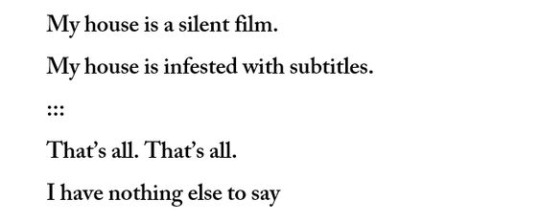

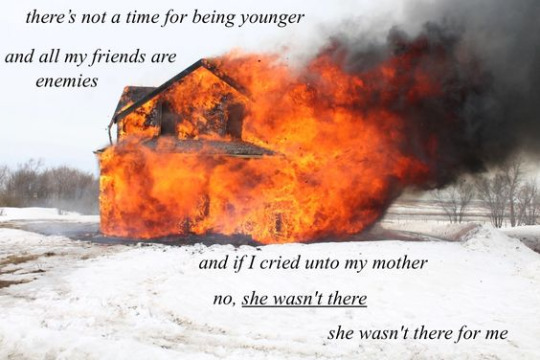
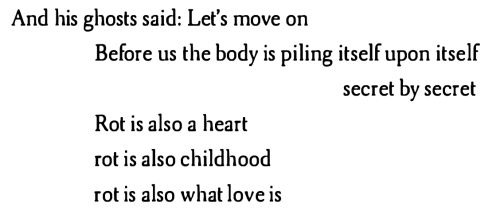
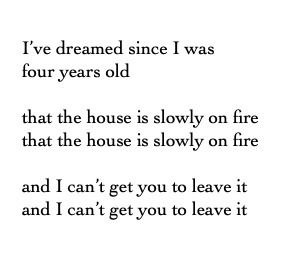




i can go anywhere i want just not home
Hieu Minh Nguyen Buffet Etiquette / Steven Berkoff The Fall of the House of Usher / image: unknown words: The Pretty Reckless Under the Water / Adonis Body (trans. Khaled Mattawa) / AroraA #6 / Robin Ekiss The Bones of August / image: unknown words: Tracy K. Smith Ash / Clementine von Radics Courtney Love Prays to Oregon / Anna Akhmatova The Last Toast (trans. Donald Michael Thomas)
i. Hieu Minh Nguyen, Buffet Etiquette
[ "My house is a silent film. / My house is infested with subtitles. // That's all. That's all. / I have nothing else to say" ]
ii. Steven Berkoff, The Fall of the House of Usher
[ "FRIEND. You must leave this house / USHER. How can I? These walls are my skin. The room is my heart. Besides, I have a sister." ]
iii. unknown/The Pretty Reckless, Under the Water
[ Background image of a burning house surrounded by snow. "there's not a time for being younger / and all my friends are enemies / and if i cried unto my mother / no, she wasn't there / she wasn't there for me" ]
iv. Adonis, Body
[ "And his ghosts said: Let's move on / Before us the body is piling itself upon itself / secret by secret / Rot is also a heart / rot is also childhood / rot is also what love is" ]
v. AroarA, #6
[ "I've dreamed since I was / four years old // that the house is slowly on fire / that the house is slowly on fire // and I can't get you to leave it / and I can't get you to leave it" ]
vi. Robin Ekiss, The Bones of August
[ "Is it history / or home / that hurts us / more?" ]
vii. unknown/Tracy K. Smith, Ash
[ Washed out image of a man standing in front of a big maze-like structure looking up at it. "House of lies / And pride and bone." ]
viii. Clementine von Radics, Courtney Love Prays to Oregon
[ "What is a home if not the first place you learn to run from?" ]
ix. Anna Akhmatova, The Last Toast
[ "I drink to our demolished house, / To all this wickedness, / To you, our loneliness together, / I raise my glass- // And to the dead-cold eyes, / The lie has betrayed us, / The coarse, brutal world, the fact / That God has not saved us." ]
#on childhood#on emotion#on loneliness#on sadness#on trauma#on growing up#tw ptsd#tw cptsd#web weave#web weaving#poetry web weave#poetry#words#writing#text#literature#quote#hieu minh nguyen#buffet etiquette#steven berkoff#the fall of the house of usher#the pretty reckless#under the water#adonis#body#khaled mattawa#arora#robin erkiss#the bones of august#tracy k smith
176 notes
·
View notes
Text
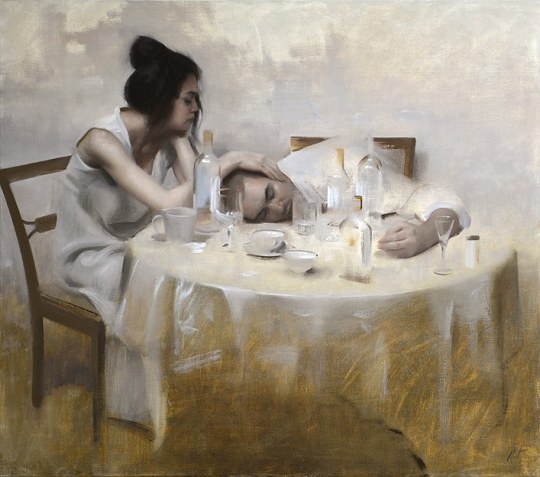
“Not to care, not to carry the bones of August into September, foiled with redness and nothing to squander but the buds of spring dormant in their boughs. Not to ask, Did you love her? and leave the answer in the ground, where everything difficult is buried.”
— Robin Ekiss, from “The Bones of August,” The Mansion of Happiness (University of Georgia Press, 2009)
Nick Alm
4 notes
·
View notes
Text

Robin Ekiss, from “The Bones of August,” in The Mansion of Happiness
#robin ekiss#august#the mansion of happiness#quote#grief#literature#poem#poetry excerpt#words#text#the bones of august#(o you who dwell in the gardens)#*
3K notes
·
View notes
Text

Robin Ekiss, The Bones of August
186 notes
·
View notes
Text
The Opposite of the Body by Robin Ekiss
Of the face in general, let me say it’s a house
built by men and lived in by their dreams.
When you’ve been plucking eyes
out of the floorboards as long as I have,
you’ll see this, just as you’d see
the patience it requires
to render an eyebrow, half an hour
and an understanding of architecture.
When you see your body,
think its opposite: not the bridge,
but its lighted face reflecting the water,
some other city as seen from a ship—
your forehead, once ponderous,
now light as umbrellas—
still not beautiful enough to make time stop.
The pleasure in being a woman’s
knowing everything’s borrowed
and can’t be denied,
as when you take apart a clock,
there’s always another inside.
from The Mansion of Happiness, 2009
2 notes
·
View notes
Text
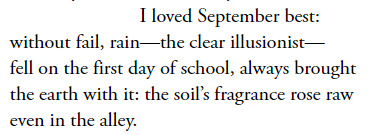







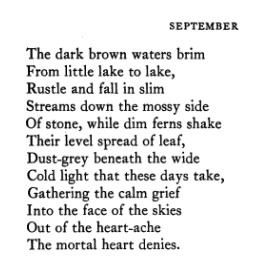

SEPTEMBER
poem beginning and ending with my death by zeina hashem beck // memory of water by reina maria rodriguez // a girl ago by lucy brock-broido // marta alvarado, history professor by marjorie agosin // mosiac by tim seibles // the bones of august by robin ekiss // peggy tony horton // september by deborah landau // september by h stuart // angel of repose by wallace stegner
[image id: 1) "I loved September best: / without fail, rain—the clear illusionist— / fell on the first day of school, always brought / the earth with it: the soil's fragrance rose raw / even in the alley."
2) "september is a month like any other and unlike any other. it seems in september everything awaited / will arrive: in the calm air, in a particular scent, in the stillness of the quay. when september comes, / i know i'm going to lose myself."
3) "Extinguish me from this. / I was sixteen for twenty years. By September I will be a ghost"
4) "In September / beyond the / breezes and the smoke / when autumn unveils its / fiery shell, / I think of you / fragile and severe, / small and immense"
5) "September: / the spiked fence freshly painted."
6) "not to carry the bones of August / into September, foiled with redness / and nothing to squander"
7) "Ah, September! You are the doorway to the season that awakens my soul... but I must confess that I love you / only because you are a prelude to my beloved October"
8) "Meanwhile August moved inward its impervious finale. / A mood by the river. Gone. One lucid rush carrying them along. // Borderless and open the days go on—"
9) "'The dark brown Inners brim / From little lake to lake, / Rustle and fall in slim / Streams down the mossy side / Of stone, while dim ferns shake / Their level spread of leaf, / Dust-grey beneath the wide / Cold light that these days take, / Gathering the calm grief / Into the face of the skies / Out of the heart-ache / The mortal heart denies."
10) "That old September feeling, left over from school days, of summer passing, / vacation nearly done, obligations gathering, books and football in the air ... / Another fall, another turned page: there was something of jubilee in that annual / autumnal beginning, as if last year's mistakes had been wiped clean by summer."
/end id]
6K notes
·
View notes
Photo

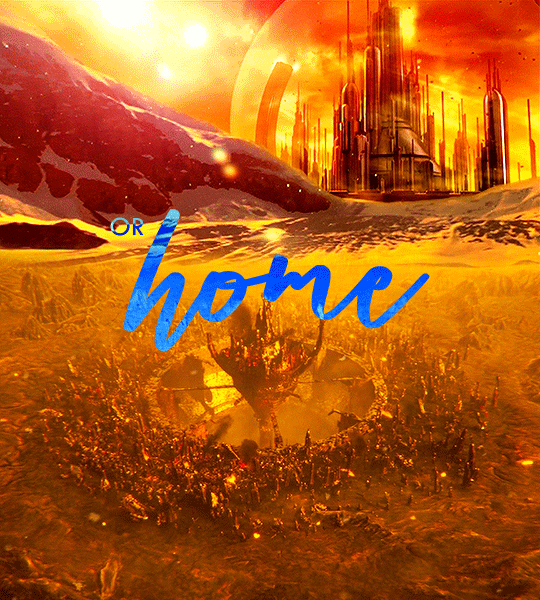

Is it history, or home, that hurts us more?
— Robin Ekiss, The Bones of August
#doctor who#dwedit#scifiedit#userdiana#userlanie#usertoph#usergiu#userdavid#gifs#mine#manifesting dw specials but only doctor x master in it
757 notes
·
View notes
Photo

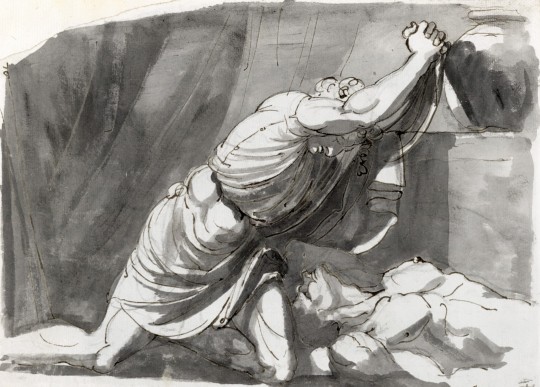
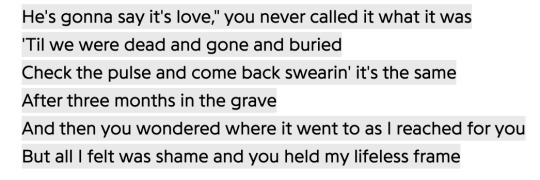
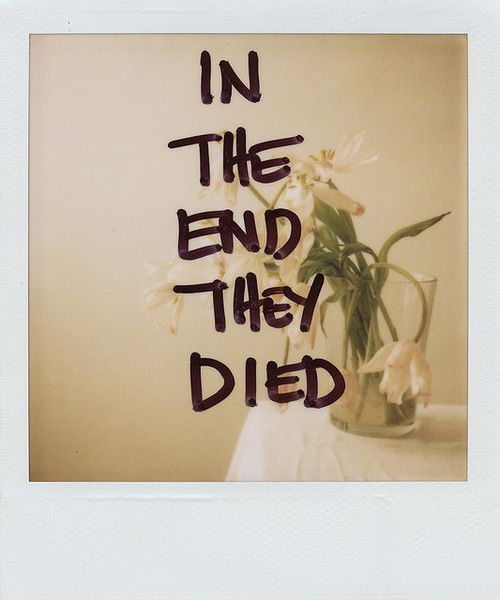

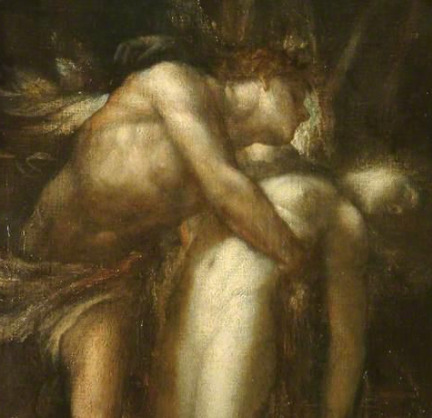



tell me we’re dead and i’ll love you even more.
@mashseason4 // henry fuseli // taylor swift // unkown // siken // george frederic watts // maggie stiefvater // lord leighton PRA // robin ekiss
543 notes
·
View notes
Photo
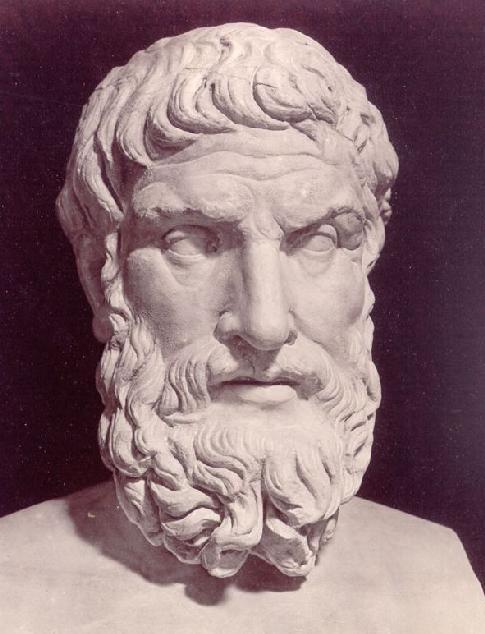
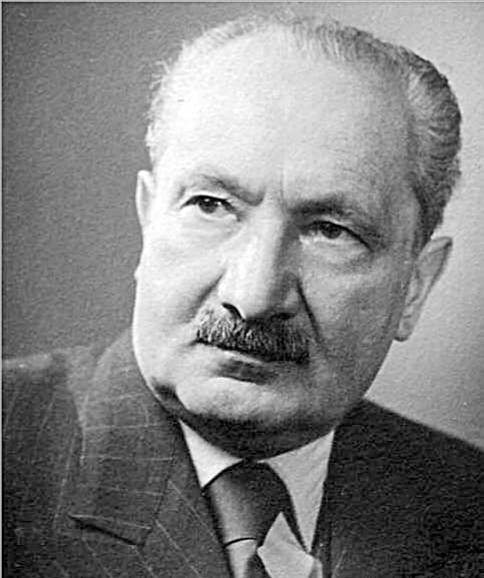
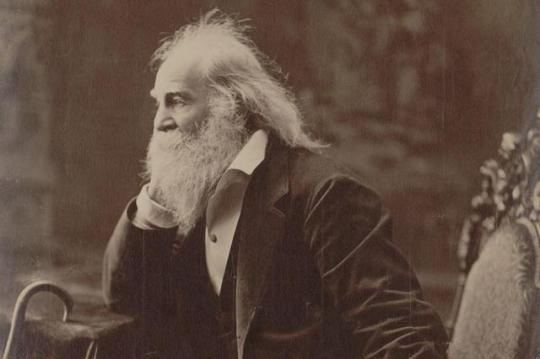
Writers
Epicurus
How to think about money, capitalism and consumer societies. This well-known philosopher discusses his views on how to be happy, something that interests me. There are a lot of different areas objects and thoughts that people say to make them happy, but Epicurus studied this and found some rather surprising results.
Epicurus set up a school and had two clokes, he lived off bread, olives and occasionally cheese. There are three main ideas about happiness he covered.
1 - He thinks friends are happiest, being unpossessive and nice. Intimate relationships are, however, often failing even though most people thought that a relationship would make them happy. Despite this, we don’t see our friends enough.
2 - People think that a lot of money makes you happy. Working in small groups like in a bakery or a boat repair shop where we’re helping others would be more ideal. The making a difference to the world element is what Epicurus thought would make people happiest.
3 - People are obsessed with luxuries such as beautiful houses and locations, however, we want to be calm and free. (9)
Epicurus set up an experiment where he bought a big house with his friends. There were separate areas for each but also shared areas. All his friends stopped working for others and took big pay cuts and replaced it with working on the farm, cooking, painting or pottery. Lastly, he and his friends stopped thinking of beautiful in spaces, but to think of calm in their minds by reading, writing, meditating, Epicurean communities spread all around the Mediterranean because of its success. Christian Church later converted these into monasteries. This space Epicurious created is arguably a heterotopia because you’re encouraged to think more and you’ve created a space with specific rules and one that isn’t a typical space.
Heidegger
A German Philosopher discusses things such as the roots to freedom and the meaning of our lives. Heidegger lived away from modern society and thought that diseased the soul. There are three main parts to that he discussed.
1 - We’ve forgotten to notice we’re alive. Heidegger talks about how there are only sometimes that we notice that we are like late at night when we’re alone or ill all day or in the countryside. This was particularly interesting as many of the scenarios described are when you’re alone with your thoughts and maybe look at things and feel things that aren’t common. We begin to think about our existence and running away from the opposite of being.
2 - All being is connected. Our jobs make us focus on day to day tasks rather than nature. Stepping away from our day to day tasks could help to understand that everything we see is existing at the same time. Heidegger wants people to use these more often to form more generosity and becoming aware of the time that we have.
3 - We forget to be free and live for ourselves. He believes that we’re already set up with prejudice. Heidegger wants us to live for ourselves instead of being superficial and surrounding ourselves with media and cities. This would help to stop trying to make others like us and help us in this process. (9)
I thought that in studying Heidegger briefly, A possibility to take from this is to try to create something that would help to view life in the ways in which Heidegger thought was good, to help us feel alive, connected and do as we want. I thought these theories were pleasant to listen to because I’ve experienced these and said about how certain things make me feel more alive, but I’ve never seen it explained in a pleasant, easy way. If I were to do this, I could ask other people what things make them feel more alive, and add it to my heterotopic space.
Walt Whitman: “A Passage to India”
Walt Whitman is a poet and created the poem “A Passage to India.” In 1896 there were two incidences that changed connections within the world forever. One was the American transcontinental railroad going from East to West, then there was the Suez Canal in Egypt, joining the Red Sea and Mediterranean sea together allowing much more effective trade without going around Africa. Asia and Europe could then benefit from the cultural exchange. Whitman saw this opportunity to celebrate and connect with traditions. This particular poem focuses on the scientific achievements that allowed this to happen, the wisdom and worldliness that could come with these connections.
The poem features a lot of unrhymed lines that’s more like natural speech and less forced. He seems extremely happy and excited by the connection concept with the lines flowing into each other and the placement of punctuation. I particularly like “The earth be spann’d, connected by net-work.” Witman is talking about the passage to India and how people will evolve and barriers will be erased. The passage is both literal and metaphorical, bridging the continents and allowing communion in all nations.
“ It’s interesting to think what Whitman might have written about other modern advances that have since made our world even smaller, like international flight, the telephone, or the Internet. “ (8) Overall his poetry links ancient religions to modern technology, encouraging a bright future.
I looked at this particular poem because I’m interested in the excitement of these connections and how much it could change the world. I’m actively thinking of heterotopias while I think about this and thinking about how heterotopias are often disconnected or isolated from other spaces or people and what would happen if they were more connected, would it be less of a Heterotopia? Airports and Shops have a specific “passage” to get in and out, but this isn’t necessarily inviting everyone inside, only a specific audience. The space within a Heterotopia is often unusual whether big or small, it’s still isolated in some way.
8. Poetry Foundation. 2019. Walt Whitman: “A Passage to India” by Robin Ekiss | Poetry Foundation. [ONLINE] Available at: https://www.poetryfoundation.org/articles/69413/walt-whitman-a-passage-to-india. [Accessed 14 February 2019].
9. YouTube. 2019. WESTERN PHILOSOPHY - YouTube. [ONLINE] Available at: https://www.youtube.com/playlist?list=PLwxNMb28XmpeypJMHfNbJ4RAFkRtmAN3P. [Accessed 14 February 2019].
0 notes
Note
Could you please do a webweave about guilt?




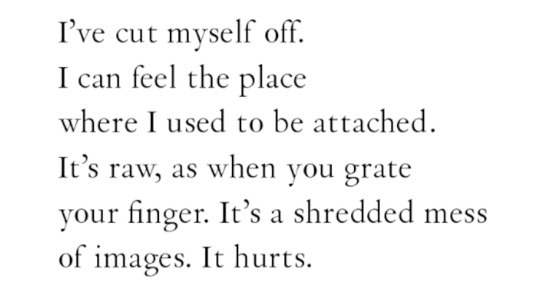

cheryl savageau mother/land: "graduate school first semester: so here i am writing about indians again" \\ frank bidart the war of vaslav nijinsky \\ robin ekiss the mansion of happiness: "the bones of august" \\ anne sexton the complete poems of anne sexton: "the double image" \\ margaret atwood the door: "europe on $5 a day" (via @flowerytale) \\ @el-im
kofi
#asks#anonymous#mine#my webweaving#webweaving#web weaving#webweave#web weave#web#webs#ww#parallel#parallels#parallelism#compilation#compilations#intertext#intertextuality#comparative#comparatives#cheryl savageau#graduate school first semester: so here i am writing about indians again#mother/land#robin ekiss#the bones of august#the mansion of happiness#anne sexton#the complete poems of anne sexton#the double image#frank bidart
340 notes
·
View notes
Text
NaPoWriMo
Hi readers, since April 1st is National Poetry Writing Month. Get writing with the prompts posted daily and show your creative side and If you use our prompts don’t forget to tag us. Here is the prompt for April 1:
1“Is it history/or home/that hurts us more?” Robin Ekiss, The Bones of August. Dive into the intersection of home and history.
3 notes
·
View notes
Quote
Of the face in general, let me say it’s a house
built by men and lived in by their dreams.
When you’ve been plucking eyes
out of the floorboards as long as I have,
you’ll see this, just as you’d see
the patience it requires
to render an eyebrow, half an hour
and an understanding of architecture.
When you see your body,
think its opposite: not the bridge,
but its lighted face reflecting the water,
some other city as seen from a ship—
your forehead, once ponderous,
now light as umbrellas—
still not beautiful enough to make time stop.
The pleasure in being a woman’s
knowing everything’s borrowed
and can’t be denied,
as when you take apart a clock,
there’s always another inside.
Robin Ekiss, “The Opposite of the Body” from The Mansion of Happiness. Copyright © 2009 by Robin Ekiss. Reprinted by permission of The University of Georgia Press.
Source: The Mansion of Happiness(University of Georgia Press, 2009)
Robin Ekiss
BiographyMore poems by this author
Poem of the Day: The Opposite of the Body
Poem of the Day: The Opposite of the Body
Poem of The Day
{$excerpt:n}
Source: Poem of The Day
http://babakziai.org/poem-of-the-day-the-opposite-of-the-body/
0 notes
Text
16 august 2018
“Aubade” -- Nam Le; “The Bones of August” -- Robin Ekiss [1]; “Two Syllabi” & “Clearing the Counter” [2] & “Living the Dream” & “Elsewhere” -- Kevin B. Lee; “ ‘You Don’t So Much Watch It As Download It’: Conceptualizations of Digital Spectatorship” -- Ariel Rogers [3]; more of Nietzsche and Philosophy -- Deleuze; more of The Junction -- Wang; Mission: Impossible - Fallout -- Christopher McQuarrie; finished Waiting for Godot -- Beckett.
The annotations in my library copy of Godot are more absurd than the play. Someone’s underlined almost every line of dialogue. Someone else has highlighted any word that’s vaguely existential. At the end, there’s finally a three-way dialogue, a confrontation between different readers/writers, although none of them will ever respond.



0 notes
Photo
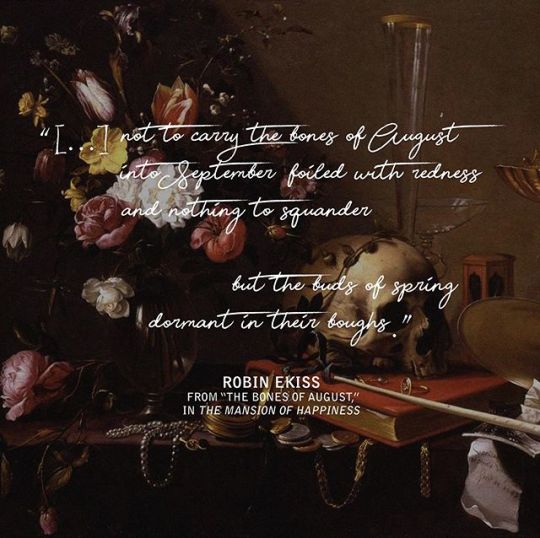
https://www.instagram.com/p/B2JPnl_hsoY/
ARTxLIT: Robin Ekiss x Adriaen Van Utrecht
—
“[…] not to carry the bones of August
into September, foiled with redness
and nothing to squander
but the buds of spring
dormant in their boughs.”
Robin Ekiss, from “The Bones of August,” from The Mansion of Happiness (University of Georgia Press, 2009)
.
.
.
🎨: Adriaen van Utrecht, Vanitas Still Life with Flowers and Skull, 1642. Oil on canvas, 67 x 86 cm.
#ARTxLIT#august#september#robin ekiss#adriaen van utrecht#quote#poem#painting#art#original edit#graphic design#*#IG
47 notes
·
View notes
Quote
Is it history
or home
that hurts us more?
Robin Ekiss, The Bones of August
109 notes
·
View notes